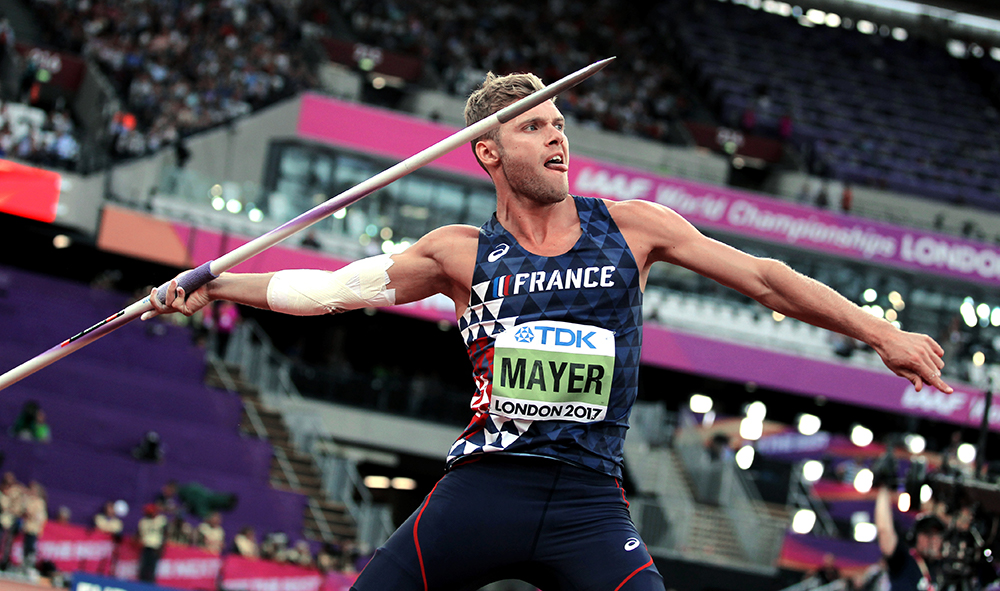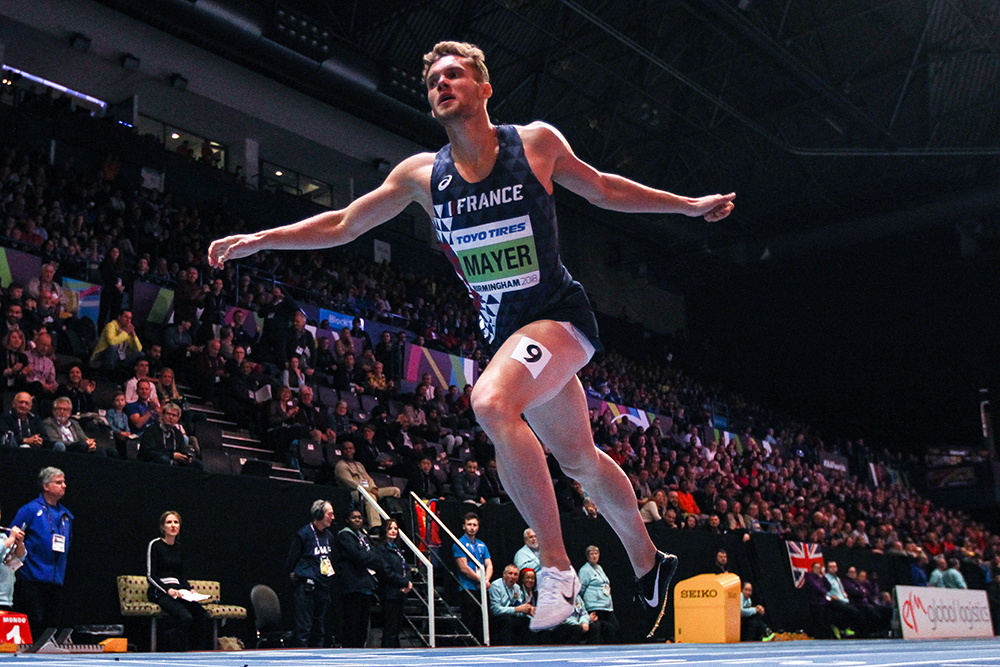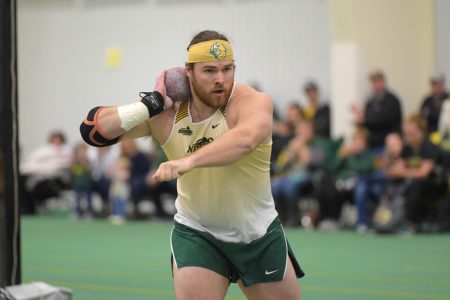
It wasn’t about revenge. Nor was it some cathartic release of frustration venting from Kevin Mayer over 2 special days—and 10 terrific events—back in mid-September.
No, the highest-scoring performance in decathlon history—his World Record of 9126 points in Talence—was not fueled by his failure at the European Championships a month earlier, where the Frenchman flunked out of the decathlon after three fouls in the long jump.
Don’t get him wrong: that day in Germany was as bad as he has had on a track, but success in an event as tough, technical and multi-faceted as the decathlon cannot be achieved on anger. “It was a very, very bad day,” he admits, casting his mind back to Berlin. “I didn’t want to do anything after that but it took maybe a day and a half to get over it. After that I had the desire to get back on track.”
Many athletes would look inward during such a time, question everything they do, but Mayer chose a better path: he wrote it off as a bad day, reminded himself he was still the world’s best—he just had to go and prove it. “It happens,” he says. “You don’t have to change everything but I wanted to keep confidence, go to other events and prove that was just a mistake I would not do again.”
He had planned a vacation for after the European Championships but that was put on ice, Mayer announcing days later that he would be on the start line at the Décastar meeting. It was where U.S. decathlete Dan O’Brien set his WR in ’92 after no-heighting in the vault at the Olympic Trials. “Décastar is a great place for redemption,” O’Brien tweeted Mayer at the time. “Trust me, I know.”
In the 5 weeks between the events, Mayer worked as hard as ever. “I took the opportunity to make myself more powerful but there was nothing about revenge,” he says. “There was frustration and I just wanted to express myself.”
That he did, recording a sublime series on the opening day of competition. Mayer opened with a PR of 10.55 in the 100, followed that with another career best of 25-7¼ (7.80) in the long jump, then threw 52-6 (16.00) in the shot. A 6-8¾ (2.05) high jump and a 48.42 lap left him with a Day 1 tally of 4563, 379 points clear of his nearest rival, but by then it was clear he was competing against someone who was not even in Talence.
Heading into Day 2 he was still 140 points adrift of Ashton Eaton’s halfway mark during the American’s WR, but the Frenchman always had the stronger second day. He opened with a 13.75 in the hurdles, threw 165-10 (50.54) in the discus and soared over 17-10½ (5.45) in the vault, 5cm above his previous best. After 8 events he knew the record could be his, a point hammered home after another PR of 235-11 (71.90) in the javelin.
“There was no pressure before the 1500 but all the fatigue of the weekend [hit me] so it was harder to go back on the line,” he says. All he needed was a 4:49, but spurred on by a vocal crowd he clocked 4:36.11 to record a final tally of 9126, breaking Eaton’s record by 81 points.
His former rival was one of the first to offer congratulations. “He called me and I asked him if he will come back to have a big fight,” recalls Mayer. “But he said to me there was a time for Ashton, and now there is a time for Kevin.”
His admiration for Eaton is hard to hide, with Mayer conceding the American was an athlete with even bigger ability. “He is better than me but he did not do a perfect decathlon like me,” Mayer explains. “He helped me achieve this with the example he set so I’m very thankful for him.”
The tears Mayer shed in Talence were of a very different kind to Berlin, and though he tried to celebrate his WR that night, the physical toll of his achievement soon hit home. “I was very, very tired,” he says.
Plagued by injuries in his early years, Mayer’s body has been bullet-proofed from injury of late and for that he credits his physical trainer, Jerome Simian, whom he describes as “the best in his field.” He is coached by Bertrand Valcin at his long-time training base in Montpellier in the south of France. Far from resting on his laurels, Mayer has been working hard there through the winter to prepare for an even-better ’19. “There are changes we’re making,” he says. “We’re doing a lot of work on biomechanics, analyzing sprinting and comparing it with that of Usain Bolt—trying to get faster and faster. But we’re not changing the coaching team; there’s no reason to change.”
If anything is different it’s the 27-year-old’s mentality; the burden of achieving what he knew he could now finally lifted. “I do feel a sense of liberation,” he says. “I knew I had the capability but I didn’t expect it to come so fast. There’s a new pressure on me now—to win all the medals.”
Mayer is the reigning world champion, but having been edged to the Olympic title by 59 points in Rio behind Eaton, there is that one key achievement missing from his résumé.
To make sure he gets gold in Tokyo, he plans to get even better over the next year. “What I’m looking at is making sure I’m learning new things each day, little steps that will help me beat this World Record again in the future,” he says. “I used to be very, very slim but now I have gained muscle mass and this makes me better at the sprints and explosive events. But it has negatively affected my 400m so I’m looking at ways to find this equilibrium.”
In the wake of his feat many reached for the Superman superlative to describe Mayer, which he doesn’t mind, though he drew the line when he heard someone refer to him as the king. “That nickname belongs to LeBron James,” he laughs. “I don’t have what LeBron has in his career.”
Slowly but surely, though, he’s getting it: fame, money and the appreciation from fans that he is the world’s greatest at his craft. But for all of Mayer’s superhuman abilities, his manner remains modest. “I don’t want to prove to people it’s because we’re superhuman that we achieve these results,” he says. “Decathletes are human; we train hard and really want to achieve and this is what I want people to believe. I don’t look for the spotlight, but it does bother me a little bit that [the decathlon] doesn’t have the popularity of other events in athletics. I try to increase its popularity on a personal level.”
In 2019 a new challenge beckons: individual excellence. Mayer still has one thing circled above all in his calendar, the World Championships in Doha, but there are other steps along the way. The first is qualifying for the European Indoor Championships in March in an individual event—either the vault or 60H. “In one sense it would almost be a holiday to only compete in one event but it’s really a challenge because we have such good specialists in France,” he says. “It would not be easy but I’m going to try.”

He will also take part in the Décastar in Talence next June, but probably not all of it. “It will be just like I did in Ratingen, to improve in certain events,” he says.
After his record Mayer took only a week’s rest before resuming gym work, then built up some overall fitness by playing volleyball and basketball with friends. By now, of course, he’s back to the grind, although he reports his body is in great working order ahead of the upcoming season. “I was injured a lot when I was young but since I met my trainer it’s going better and better. I don’t fight with injuries, I just fight with my events and this is the best way to improve.”
Beyond Tokyo, an obvious landmark looms far on the horizon—the Paris Olympics in ’24, a chance to win gold (maybe even his second) on home turf. “I’ve never done a championship in France, and this is why I was so happy to set the World Record there because the spectators were able to enjoy it.”
But looking to the short term, might another WR be on the cards in ’19? “I don’t want to talk about scores. I just want to be world champion again—so there is a lot of work to do.”






